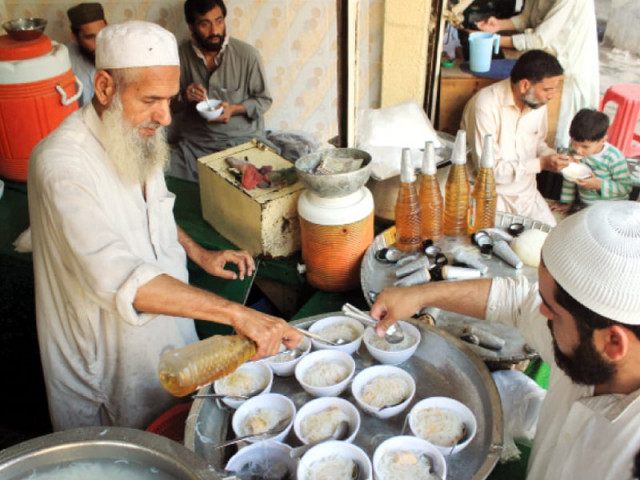Mere trifles: The falooda of the Frontier gives milk a shake for its money
Chilled vermicelli and kulfi drink appears to have come to Peshawar in 1953.

Mere trifles: The falooda of the Frontier gives milk a shake for its money
The Americans call it an ice-cream sundae, but perhaps the Indian Subcontinent can claim to have adopted the Persian faloodeh recipe much before. In fact, some histories say the vermicelli, ispaghol and rosewater delight were created during the time of king Nader Shah. And while variants have existed in India for centuries, it appears to have surfaced in Peshawar in 1953.
Mohammad Yousaf is believed to have been the first person to bring falooda to Peshawar. Yousaf’s son, Sheikh Ihsan Elahi, who is a dealer at Shaheedano Chowk at Qissa Khwani Bazaar now, says his father came from Punjab where the drink was famous for being made in Kasur. “He set up a makeshift stall. Prior to this, there was no falooda shop in Peshawar,” he claims. It was a novel thing because otherwise the bazaar was famed for its green-tea kahwa.
For the longest time, there were only three major outlets where you could get a glass: Al-Sheikh, Frontier and Fida Hussain. “Most of the new shops have opened over the past decade or so and have extended to other parts of the city,” Elahi said.
Frontier Falooda’s owner Naseemullah also pegs the arrival of the recipe to the early 1950s. He inherited the business from his father and corroborates Elahi’s history by saying that, as far as he knew, the first person to sell falooda opened a makeshift stall at Shaheedano Chowk. That would be Elahi’s father, Mohammad Yousaf. “That man later opened his shop in the same vicinity and other shops followed suit,” explains Naseemullah.
Today the chilled drink has become a hot favourite in the bazaar and over two dozen outlets offer it here, not to mention in other parts of the city. Some of them have even added milkshakes to their menu.
The falooda business in Qissa Khwani, is, however, seasonal. As winter approaches some of the outlets replace their chairs and cups with stalls for winter garments and other products. “In winter, we sell warm clothing, while falooda season lasts from February through October,” Naseemullah says. But some shop owners claim that despite the cold, some people will still come asking for a falooda.
The main ingredients, according to Naseemullah, are kulfi and vermicelli; but added to it are rosewater, ispaghol, pistachios, almonds, basil seeds and powdered sugar. Frontier Falooda prepares the vermicelli noodles at their shop. “The noodles have to be chilled while being prepared, otherwise, they will not turn out properly,” he says. The other ingredients have become costly over the years. “Now a liter of milk costs Rs100, and we pay in the thousands for milk alone,” he adds. Electricity, labour, rent, all add up. Elahi manages to sell a glass for Rs50, but it costs him Rs40 to make it, so there is a squeeze on his profit margin. But it is simply not possible to raise prices because of the competition.
Still, these purveyors of this milky concoction can rest assured that given the falooda’s popularity, they aren’t going to lose their customer base any time soon. Habibur Rehman, for example, says its de rigueur to have a glass if you go to the bazaar. “If I visit Qissa Khwani and do not enjoy a falooda, then for me it’s like I never visited.”
Published in The Express Tribune, July 13th, 2014.













COMMENTS
Comments are moderated and generally will be posted if they are on-topic and not abusive.
For more information, please see our Comments FAQ